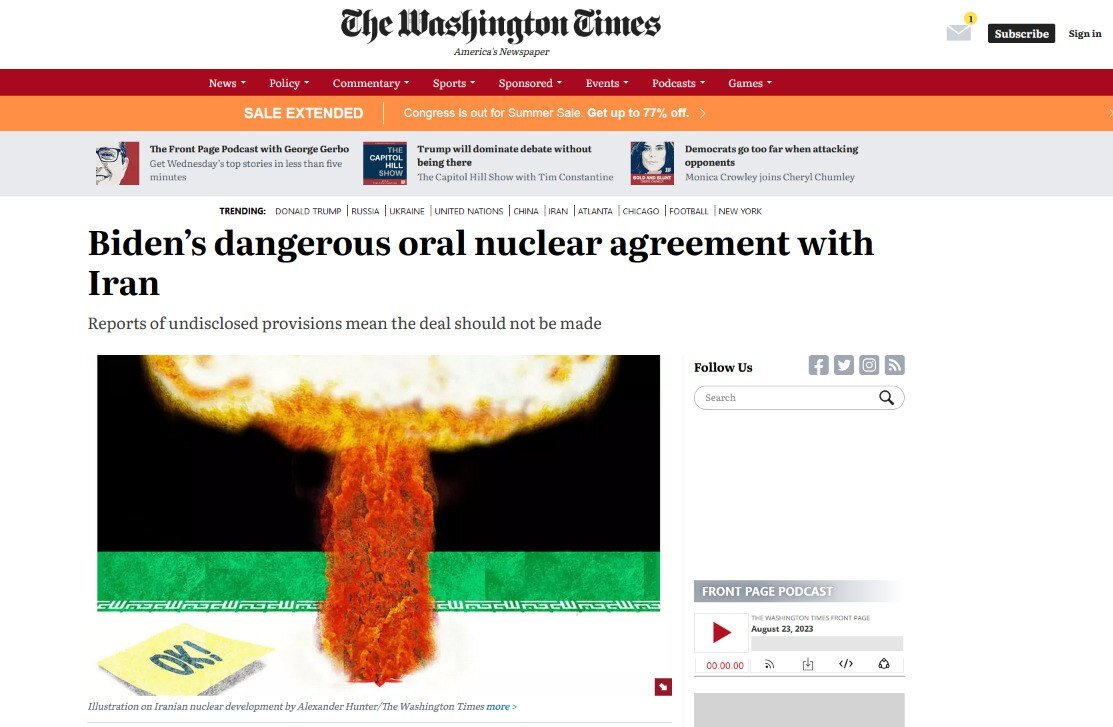Release of Iran's frozen funds is a rightful access not a favor

TEHRAN - The Washington Times on August 22 published an article titled "Biden's dangerous oral nuclear agreement with Iran".
The article, written by Jed Babbin, a national security and foreign affairs columnist, addresses the prisoner swap agreement between the U.S. and Iran that was reached on August 10 and poses a question about the silence of the White House about the issue.
Babbin added more details about the prisoner swap agreement according to which Iran will be paid a “ransom” of $6 billion of its frozen funds; instead, Iran will dilute some of its 60-percent-enriched uranium. He labels the deal as a never-should-be-made deal since the diluted uranium can be enriched later.
Relying on the European spy agencies, Babbin said, "Iran is increasing its covert acquisition of nuclear technology," accusing Iran of “preparing the underground nuclear weapon test."
West has kept its alarm-raising policy regarding Iran's nuclear program. Western officials and media outlets keep raising concerns about Iran's peaceful nuclear program. Moreover, the recent prisoner swap has also turned into a hot topic that in the eyes of Western media, especially the Washington Post's August 22 article, is a great favor to release Iran's frozen funds in South Korea, calling it a “ransom”.
The proper answer to the article will be provided from various aspects:
First, Babbin calls the release of Iran's frozen funds "ransom," which is Iran's money that has been illegally blocked in other countries for several years due to the U.S. bullying policy. It is the right of every country to have access to its assets. Yet blocking the assets and their repayment under any agreement cannot be considered a 'favor.'
Second, according to the announcement of the U.S. intelligence assessment published in the Associated Press on July 10, Iran was not developing nuclear weapons and was not pursuing them. Meanwhile, Iranian officials have repeatedly emphasized that the nature of Iran's nuclear program is purely peaceful.
Despite the U.S. intelligence assessment and the Iranian officials' emphasis on the peaceful nature of the country's nuclear program, the Western media outlets kept demonizing Iran's peaceful nuclear program. They have created an atmosphere that Iran may weaponize its nuclear program.
Third, the Westerners rely only on their analyses of Iran's nuclear program and do not have any documents or evidence. But the fundamental question is, if Western and American officials are concerned about Iran's peaceful nuclear program, why did they withdraw from the JCPOA? The JCPOA was an agreement that limited Iran's nuclear program to a large extent. Donald Trump, former U.S. President, withdrew from the JCPOA in 2018, and Europe did not adhere to its commitments.
After the U.S. pullout in 2018, Europe promised 11 commitments to Iran under INSTEX, which was not implemented. Inaction by the European side prompted former Iranian Foreign Minister Javad Zarif to say "Iran will keep progressing with or without JCOPA."
INSTEX, the Instrument in Support of Trade Exchanges, was a European special-purpose vehicle (SPV) established on January 31, 2019, to facilitate non-USD and non-SWIFT transactions with Iran to avoid breaking U.S. sanctions.
For the Europeans, INSTEX was a prerequisite for implementing their 11 commitments after the U.S. quit the JCPOA. It was supposed to become a mechanism independent of the U.S. sanctions and open the trade route to Iran and Europe, but it defined itself under the U.S. sanctions and practically did nothing.
Fourth, the claim that Iran has failed to comply with the JCPOA agreement directly contradicts the International Atomic Energy Agency (IAEA) reports, which have proven Iran's adherence. The American officials have not made a claim that Iran is not complying with its JCOPA commitments. Even after Trump's exit from the JCOPA, Iran fully implemented its commitments for one entire year. After that, Iran reduced its commitments but remained adherent to the JCPOA.
In the end, Babbin, the article's author, claims that Biden has had an oral and unwritten agreement with Iran, and then he criticized this illusory agreement. First, such an agreement does not exist, at least for now. Secondly, if such an agreement exists, which U.S. imposed sanctions on Iran have been canceled so far?
